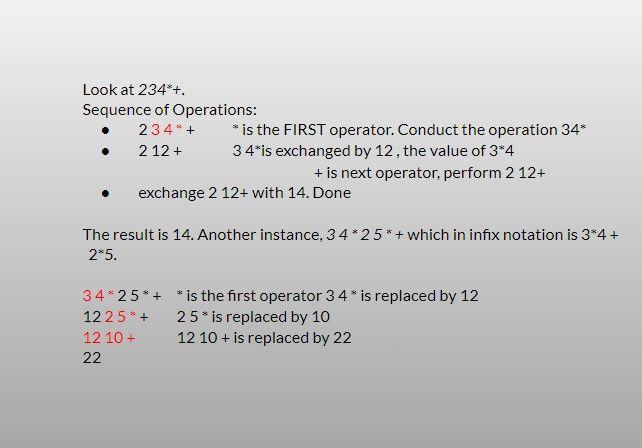How to Evaluate Postfix Expression

Introduction to Postfix Expression
- An operator is printed after its operands in a postfix expression.
- In postfix notation, the infix expression 2+3 equals 23+.
- Operations on postfix expressions are conducted in the sequence in which they are printed (left to right).
- There is no need for brackets. In postfix notation, the infix expression 2+3*4 equals 234*+.
- In postfix notation, the infix expression 3*4+2*5 converts to 34*25*+.
342+*5* is the infix expression for 3*(4+2)*5.
Evaluation of Postfix Expressions
2+3*4 (infix) ----- > 234*+ (postfix) expression.
Notice:
- In both expressions, the operands (2,3, and 4) appear in the same order.
- The operators (* and +) appear in the order that they are performed in the postfix version — the multiplication comes before the addition. Writing the operators in the order that they are conducted makes postfix expressions convenient to analyze using the algorithm method:
- Scan the expression from left to right until you come across an operator, @ (@ stands for + - * or /).
- Carry out the operation @. The operands come before the operator, which is 3 4 + = 3+4= 7.
- Substitute @ and its operands with the computed value in the expression.
- Repeat steps 1-3 until no more operators are accessible.

Parentheses are not required in postfix notation.
- "Stack-based postfix evaluation" Scan the string from left to right.
- When you come across an operand, place it on the stack; when you come across an operator, remove the corresponding operands from the stack, perform the operation, and place the result back on the stack.
- When you finish searching the expression, the value obtained is still on the stack.
Contemplate the postfix expression 234*+ as an example.
An algorithm for evaluating postfix expressions is provided below :-
- Make a few simplifying assumptions to eliminate some unnecessary and non-instructive details:
- All of the numbers entered are single digits (0..9).
- The input string contains no whitespace. Thus, 345+* is correct, but 345+* is not.
- The only allowed operators are +,-,*, and /, where / represents integer division.
All of the input data is correct.
Thus, a typical input string is 23*73/+, which is 2*3 + 7/3 in infix notation (value is 8).
Making these assumptions, the algorithm for postfix evaluation is :
- Read a character
- Convert to int and push
- If the character is an operator pop the stack twice to obtain two operands
- Push the outcome of operation
- Remove the final value from the stack
How to convert Infix to postfix :
While characters are still present in the infix string:
Read the given character from the infix string
>> If the character is an operand, append the character to the postfix expression.
>> If the character is an operator @, pop the stack and append the operator to the postfix expression if the stack is not empty and an operator of greater or equal priority is on the stack.
>> If the character is a left parenthesis (push the parenthesis onto the stack if the character is a right parenthesis) and the top of the stack does not contain a matching left parenthesis (pop the stack and append the operator to postfix pop the stack and discard the returned left parenthesis)>> Append to postfix any remaining items on the stack.
Examples
Steps for evaluating postfix expression :
1. In the post variable, acknowledge postfix expression string.
2.
3. Finally, remove the result from the stack and store it.
